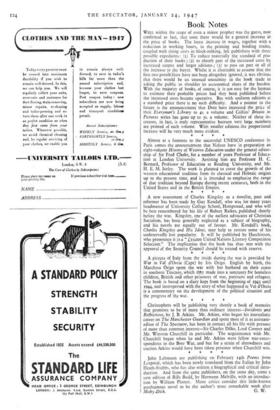Book Notes
WELL within the Lcope of even a minor prophet was the guess, now confirmed as fact, that soon there would be a general increase in the price of books. The latest increase in wages, together with a reduction in working hours, in the printing and binding trades, coupled with rising costs in block-nikking, left publishers with three possible expedients : (t) To reduce materially the standard of pro- duction of their books • (2) to absorb part of the increased costs by increased output and larger editions ; (3) to pass on part or all of the increase to the buyer. Whilst it is charitable to assume that the first two possibilities have not been altogether ignored, it was obvious that there would be an unusual unanimity in the book trade in asking the public to shoulder its accustomed share of the burden. With the majority of books, of course, it is not easy for the layman to estimate their probable prices had they been published before the increased costs became operative. But with uniform editions at a standard price there is no such difficulty. And a pointer to the future is the announcement that Dent have increased the price of their Everyman's Library to 4s. a volume and Collins' Britain in Pictures series has gone up to 5s. a volume. Neither of these in- creases, in fact, is truly representative because very large numbers are printed of each volume. With smaller editions the proportional increase will be very much more evident.
Almost as a footnote to the successful UNESCO conference in Paris comes the announcement that Nelson have in preparation an eight-volume History of Western Education under the general editor- ship of Sir Fred Clarke, for a number of years Professor of Educa- tion at London University. Assisting him. are Professor H. C. Bernard, Professor of Education at Reading University, and Mr. H. E. M. Iceley. The work is planned to cover the growth of the western educational tradition from its classical and Hebraic origins up to the present time, and it is intended to emphasise the range of that tradition beyond Europe during recent centuries, both in the United States and in the British Empire. * * * * A new assessment of Charles Kingsley as a novelist, poet and reformer has been made by Guy Kendall, who was for many years headmaster of University College School, Hampstead, and who will be best remembered for his life of Robert Raikes, published shortly before the war. Kingsley, one of the earliest advocates of Christian Socialism, has been generally neglected as a subject of biography, and his novels are equally out of favour. Mr. Kendall's book, Charles Kingsley and His Ideas, may help to restore some of his undeservedly lost popularity. It will be published by Hutchinson, who pronounce it as a " kro,000 United Nations Literary Competition Selection." The implication that the book has thus met with the approval of the Security Council should be treated with reserve. * * * * A picture of Italy from the inside during the war is provided by War in Val d'Orcia (Cape) by Iris Origo. English by birth, the Marchesa Origo spent the war with her husband on their estate in southern Tuscany, which they made into a sanctuary for homeless children, British and other prisoners of war, partisans and refugees. The book is based on a diary kept from the beginning of 1943 until 1944, and interspersed with the story of what happened at Val d'Orcia is a commentary on the development of the political situation and the progress of the war. * Christophers will be publishing very shortly a book of memoirs that promises to be of more than ordinary interest—Incidents and Reflections; by J. B. Atkins. Mr. Atkins, who began his journalistic career on The Manchester Guardian and spent most of it as assistant- editor of The Spectator, has been in contact all his life with persons of more than common interest—Sir Charles Dilke, Lord Cromer and Mr. Winston Churchill in particular. The acquaintance with Mr. Churchill began when he and Mr. Atkins were fellow war-corre- spondents in the Boer War, and but for a strain of shrewdness and caution Atkins would have been taken prisoner when Churchill was. * * * * John Lehmann are publishing on February 14th Poems from Leopardi, which has been newly translated from the Italian by John Heath-Stubbs, who has also written a biographical and critical intro- duction. And from the same publishers, on the same day, come a new edition of Billy Budd, by Hermann Melville, with an introduc- tion by William Plomer. Many critics consider this little-known posthumous novel to be the author's most remarkable work after


































 Previous page
Previous page